Temple Sholom Rabbi Ari Jun, the former director of the Cincinnati and Dayton JCRC, and senior rabbi at the Cincinnati synagogue since last December, was abruptly disinvited from speaking at a Sunday rally opposing the rise of white supremacy because he is pro-Israel.
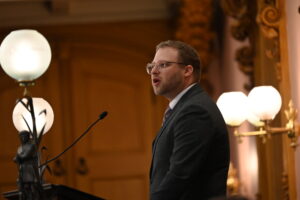
Rabbi Ari Jun delivering an invocation at the Ohio Statehouse (courtesy)
Jun had been scheduled to speak at Sunday’s Queen City United event at Washington Park after responding to a call for faith speakers on Feb. 26. However, on March 5, event organizer Laini Smith notified him that he would no longer be participating.
In their message to Jun, Smith said someone had brought to their attention “some of your values do not truly align with the values this protest is trying to represent.”
Billie Pittman, another organizer was more explicit: “Rabbi Ari Jun is a well-known Zionist, and while this event is intended to oppose Nazis and white supremacy, allowing Zionists to participate undermines the original goal of the demonstration.”
Jun challenged the dismissal, asking if Smith referred to his stance on Israel, which he noted that the majority of Jews share.
“I would call myself a liberal zionist,” said Jun. “I am attacked by people to the right of me in the Jewish community for being insufficiently allegiant to Israel, and I am attacked by progressives for having any association with Israel. I don’t consider all anti-Zionism to be antisemitism, but I do know there is a dramatic overlap between the two.”
Jun, a target of attacks from some groups in the Cincinnati area, wrote in an op-ed in the Cincinnati Enquirer last month that President Donald Trump’s Gaza plan is “nothing short of the dictionary definition of ethnic cleansing.” He also took part in the Jewish Council for Public Affairs Summit on Coalition and Bridge Building Post-Oct. 7, an event aimed at building allyship to counter antisemitism and bigotry in the wake of Hamas’ Oct. 7, 2023 attack that left more than 1,200 dead and 250 taken hostage. He also wrote on his own blog in November 2023, in advance of the Jewish community rally in Washington, D.C., that “If our empathy extends only to Israelis and Jews…we play into Hamas’s hands.'”
Smith, in a statement, said: “ I cannot in good conscience invite someone to speak at this event who refuses to condemn colonial disposition of Palestinians…This wasn’t about Rabbi Jun personally, but about ensuring that the space remains aligned with the fight against systemic oppression in all forms. We welcome Jewish voices who share this commitment to collective liberation. Our stance is firmly rooted in anti-fascism, anti-racism, and anti-apartheid values.”
The decision, as it became public, has led to significant discussion on the Facebook event page.
“Organizers have been writing paragraph upon paragraph, explaining to the Jewish community who’s upset why Zionism is unacceptable,” said Jun. “So this wasn’t a slip of the tongue but a revelation of their values.”
Pittman posted on the event’s Facebook page: “We are in the works of having another speaker from the Jewish community.”
In a statement posted on the Facebook event, Smith said that they believe hate has no place in Cincinnati, but they also believe that “standing up against white supremacy, neo-Nazism, and other forms of oppression requires us to critically engage with the full scope of ideologies and actions that perpetuate harm.”
“The decision to not invite Rabbi Jun-Ballaban was not based on his Jewish identity, but rather on a fundamental divergence in values,” Smith wrote. “Our event is rooted in a commitment to challenging white supremacy, ethnic cleansing, and the ongoing harm against marginalized communities.”
Jun’s Zionism puts him in the mainstream of the Jewish community. According to a 2021 Pew Research study, 80 percent of U.S. Jews say caring about Israel is an essential or important part of what being Jewish means to them. Nearly six-in-ten say they personally feel an emotional attachment to Israel, and a similar number share say they follow news about the Jewish state at least somewhat closely.
In 2024, the American Jewish Committee Survey of American Jewish Opinion found that 85% of U.S. Jews think it’s important for the United States to support Israel in the aftermath of the terrorist attack on October 7.
According to the Facebook messages between Jun and Smith, which Jun shared with Cincy Jewfolk, his plan was to speak about the threat of white supremacy, which Smith said “would be perfect.”
While the decision to ban Jun was not publicly announced, Smith blamed people who made public comments on the event page for “discrediting our efforts and motives” rather than showing “genuine concern.” Smith also pushed back against Jun in their messages, asking why he was telling people he was “uninvited for being Jewish as if we didn’t already know you were Jewish when we invited you?”
“[Event organizers] put out a public call for speakers, I responded to it and said I was bringing a delegation members of Jewish community,” said Jun.
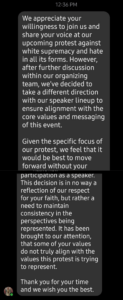
Screenshot of a message between Rabbi Ari Jun and the event organizers.
Jun responded by asking what the reason was for being uninvited after organizers were seeking faith leaders to speak. He did not get a response with specifics, but rather a more general response that the organizers’ “values are firmly rooted in standing against violence and justice wherever it occurs whether in the context, Israel, Palestine, or elsewhere. Our decision to limit participation was not based on someone’s background but on the context of advocating for peace, justice, rights, which requires us to critically engage involved.”
Jun described himself as going into this rally with open eyes, even telling congregants that to “counter nazism,” they would need to show up in spaces where they may feel uncomfortable. Since his dismissal by organizers, he said he feels differently.
“It’s one thing to go to a rally expecting different people with disagreeing viewpoints to show up as their full selves, and for that to create discomfort and to live with that discomfort,” he said. “It’s another thing for us as a Jewish community to be told, ‘you cannot show up as your full selves.’”
















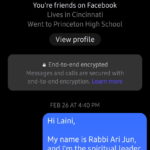
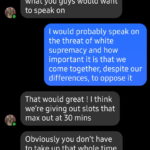
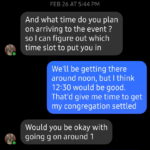
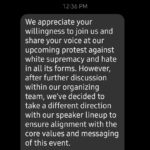
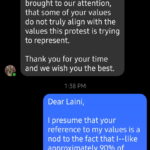
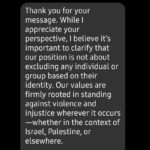
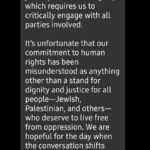
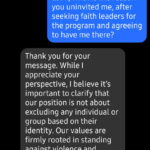
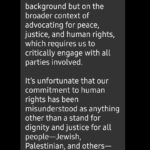
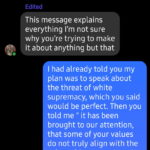



The exclusion of a rabbi who supports the National liberation Movement of the Jewish people is a disgrace. The organizers of this event should hang their heads in shame!
I firmly stand behind Rabbi Ari. As jews we are taught to stand up to intolerance and injustices in thought and deed. And yet one hypocrite can uninvite Rabbi Ari for his love of Isreal
Is Israel perfect or always right , No
But we can still love it and want it to be better . Just as we want America to be better than the kkk and other haters.
I guess the organizers only want jews who hate Isreal to. Show. Up.
Wow! I am shocked, disappointed and upset by the decision and actions of the “event organizers“. Unfortunately, I’m afraid that a lot of people don’t really understand the connection that we Jews have with Israel, even though we may not approve or agree with all their actions.
Rabbi Ari is exactly what a Jew should be – a sympathetic critic of Israel without confusing that with its current government. This intolerance by the “tolerant” left shows how much it had moved toward the spectrum into Stalinism. As a liberal I’m afraid it will come full circle and make alliance with the extreme right, much as Nazi Germany and Stalinist Russia made common cause and worked together from 1938-1941.
Basically this is another form of suppression. If you don’t have exactly the same opinions as us, you’re not welcome. Even though his voice in this matter is 100% worthy and appropriate for the topic! I think there is complete tunnel vision by these organizers and they are doing a disservice to our community.
I stand behind Rabbi Jun and all liberal Zionists. Am Israel Chai!
The organizers of this rally fit the description of antisemites perfectly, according to firmer Prisoner if Zion, Anatole Scharansky. It is the 3 Ds. When you Demonize Israel, Delegitimize Israel, and apply Double standards to Israel- you are an antisemite.
The real question in the table is, who among elected officials will attend?
Rabbi Jun was disinvited because he took a stance against the City Council’s resolution on a permanent ceasefire in Gaza, according to the organizers. The consider him, and all zionists, someone who supports genocide, apartheid, colonialism etc. People need to be educated in this community. They do not know what zionism really is. They do not know what they mean when they call for an intifada. It is up to the Jewish community to get out there and do this educating! It’s happening in other cities, why not Cincinnati?